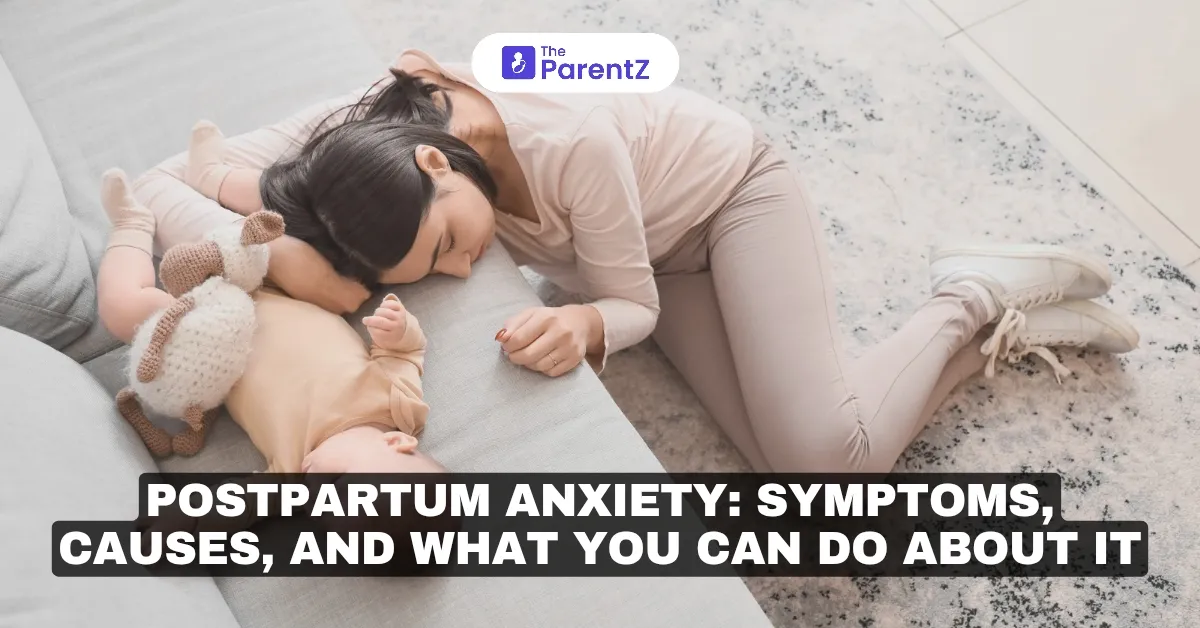Bringing a baby is one of the most joyful moments for every parent. However, it's simultaneously tiring too. While most moms might be familiar with the concept of baby blues and postpartum depression, postpartum anxiety is an equally overwhelming yet less discussed condition.
If you, too, have been lately finding yourself constantly worrying about your baby, unable to sleep, or struggling with intrusive thoughts, it might be postpartum anxiety. According to a survey, it affects nearly 10-15 percent of new mothers, while most cases go undiagnosed.
Unlike the baby blues, where the symptoms fade within a couple of weeks, postpartum anxiety can persist and interfere with your daily routine if left untreated.
Read this article to explore what exactly postpartum anxiety is, the signs to recognize it, and how you can deal with it.
Postpartum Anxiety: What Is It?
Postpartum anxiety is a condition where new mothers experience excessive worry, fear, or panic after childbirth. Though a slight level of anxiety is normal, postpartum anxiety actually goes beyond the usual parental concerns and may show physical symptoms, intrusive thoughts, and, in worst cases, panic attacks.
Contrary to postpartum depression, which is synonymous with sadness, withdrawal, or hopelessness, postpartum anxiety is typically driven by relentless worry and a constant sense of dread. For some moms, this experience is equal to feeling on edge all the time.
Symptoms of Postpartum Anxiety
Postpartum anxiety can impact new mothers both emotionally and physically. Here are some common symptoms:
Emotional Symptoms
- Constantly worrying about your baby’s health and safety
- Feeling restless or easily irritated
- Intrusive thoughts of something bad happening
- Fear of being a bad mother or not doing enough for your baby
Physical Symptoms
- Racing heart
- Shortness of breath
- Trouble sleeping, even when the baby is asleep
- Headaches, nausea, or dizziness
Why Does Postpartum Anxiety Happen?
There are several possible reasons behind postpartum anxiety, including hormonal changes, lack of sleep, and personal history.
Hormonal Changes
The fact is—right after delivery, estrogen and progesterone levels drop drastically. This sudden hormonal change can impact mood and increase anxiety. Besides, the stress hormone known as cortisol also rises, which results in further panic in new moms.
Lack of Sleep
Lack of sleep is one of the most common concerns for new mothers. Sleep deprivation eventually intensifies anxiety, thus making it even more difficult to regulate emotions and think properly.
Personal or Family History
Another surprising fact is that mothers who have a history of anxiety or depression are at an even higher risk of experiencing postpartum anxiety.
What You Can Do About Postpartum Anxiety
Yes, postpartum anxiety is treatable. In fact, with the right support, many moms have already recovered. Here are a few effective tips on how to deal with this condition:
Sleep as much as possible
The truth is—even small changes in sleep can really help when it comes to dealing with postpartum anxiety. For example, you can try to nap when the baby naps, maybe ask for help, and avoid scrolling on your phone at night for better sleep.
Deep Breathing and Mindfulness
Mindfulness techniques, such as meditation and deep breathing, can actually calm your nervous system and reduce anxiety spikes. Yes, by giving even five minutes a day, you can notice a big difference.
Consider Medication if Needed
For severe cases, your healthcare provider may also recommend certain medications. Make sure to discuss anxiety medications that are safe for breastfeeding moms with your doctor.
Reduce Caffeine and Sugar Intake
Cannot get rid of your morning coffee? Well, it's time to. High caffeine intake can further worsen anxiety symptoms. Therefore, you can switch to decaf or herbal teas and rather incorporate nutrient-rich meals to stabilize blood sugar levels.
Final Thoughts
Postpartum anxiety affects almost every 1 in 10 new mothers, and it's way more common than many may realize. By seeking support at the right time, you are actually taking your next step towards rediscovering your peace of mind. At the end, every mom deserves to enjoy her journey of motherhood.








Be the first one to comment on this story.